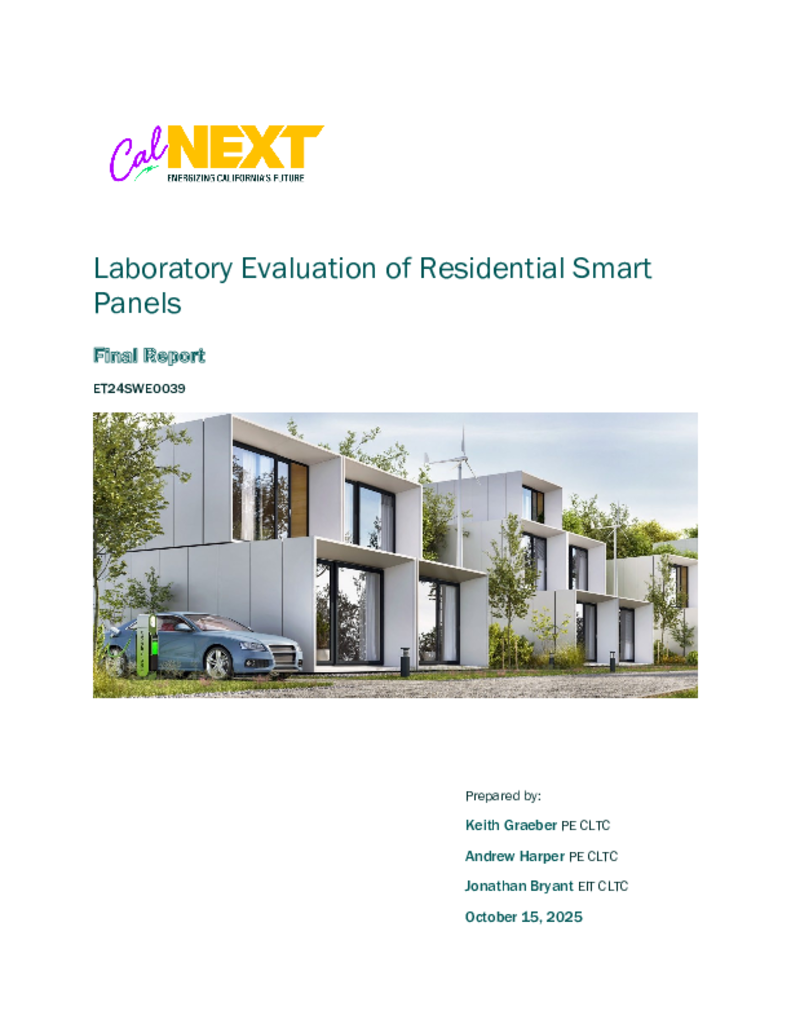ET24SWE0039 - Laboratory Evaluation of Residential Smart Panels
With increased residential electrification, households are reducing their carbon footprint by replacing gas appliances and vehicles with all-electric alternatives. In California, the state has set a goal to reach 100 percent zero-carbon energy by 2045 (Executive Order B-55-18). While the reduction of GHG emissions is positive, electrification increases the strain on electrical infrastructure. Many existing homes are not equipped to handle the additional electric load that electrification creates due to electrical service and panel limitations. It’s estimated that 46-58 percent of the country’s 86 million single family homes will require a panel upgrade to support full electrification. This means 5.5 million Californian households will require expensive and time-consuming electrical panel upgrades to fully unlock electrification’s as-advertised benefits.
One emerging technology category that aims to be the enabling solution for residential electrification is Smart Panel technology. A smart panel monitors a home’s electricity consumption and turns off lower priority circuits to ensure active loads remain under the home’s maximum rated electrical service and panel requirements. This in turn can also allow for an increased number of connected electrical devices. Some smart panels can even integrate with existing DERs to enable load shifting and electricity export back to the grid.
Smart panels are relatively new to the market, and they are not well understood in terms of capabilities and potential. Additionally, features between any two “smart panels” can vary dramatically, because there is not a standardized “smart panel” definition. Currently, codes and standards focus only on system safety and not functionality.
UC Davis, in partnership with VEIC, will characterize commercially available smart panels and provide transparent information on system capabilities and integration opportunities. The team will assess smart panels’ ability to provide energy-efficiency improvements, deliver load flexibility and reduce electrification costs for California homeowners.
Widespread residential electrification in California is constrained by legacy service panels (100–125 A) that cannot support concurrent operation of high-demand loads such as heat pumps, EV chargers, and electric dryers. Conventional service upgrades are expensive, require utility coordination, and disproportionately burden lower-income households. Smart electrical panels offer a potential alternative by dynamically managing circuit-level loads to prevent main-breaker trips and defer service upgrades, but there is limited independent validation of their technical performance or market readiness.
This project evaluates three commercially available smart-panel architectures—a full smart-panel replacement, a downstream smart subpanel, and retrofit smart breakers—through controlled laboratory testing at UC Davis and stakeholder engagement with contractors, utilities, and building-department officials. Laboratory testing assessed service-upgrade-avoidance (SUA) behavior using overload conditions from 5% to 100% above configured limits, circuit-level metering accuracy, and load-reenergization logic. Stakeholder engagement examined awareness, perceived barriers, and inspection challenges.
All systems successfully prevented sustained overloads below main-breaker thermal-trip curves, demonstrating technical feasibility for SUA. The panel-replacement system employed overload-dependent and adaptive 1–6 min recovery intervals. The smart subpanel initiated shedding within ~4 seconds but used a fixed 1-min re-enable timer, producing frequent cycling under sustained loads. The smart-breaker system relied on user-defined “scenes” rather than automated sensing, providing limited autonomous protection and depending heavily on correct configuration. All products achieved circuit-level metering accuracy within ±5 W of laboratory reference equipment, sufficient for consumer feedback but not revenue-grade. Advanced features marketed as demand response, TOU optimization, or carbon-signal control were either minimally implemented or dependent on third-party smart-home platforms.
Interviews revealed low installation experience, inconsistent inspector familiarity, unclear software-driven control behaviors, and high upfront cost as primary barriers. Results indicate that smart panels can technically defer service upgrades today, but broader adoption will require improved software transparency, installer training, and aligned permitting/inspection procedures.

